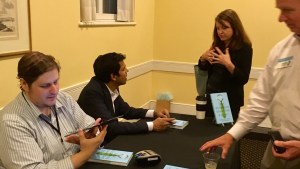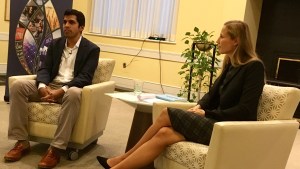News & Stories
Can business save the world?
Can business save the world? Duke University’s Dr. Aaron Chatterji came to UNC Kenan-Flagler to answer that question and speak more broadly about the role business plays in sustainability with UNC and Duke MBA students.
For the long answer to this question, you can read his book “Can Business Save the Earth? Innovating Our Way to Sustainability. As MBA students stretched for time, we were grateful for the short and sweet answer: “No.”

Chatterji started writing his book driven by the belief that the private sector could and should be able to solve the great
environmental challenges of our time. His research to understand how companies were responding to climate change and other environmental crises revealed that business was a necessary part of the solution but insufficient on its own.
Environmental challenges are, “simply too big and complex for any one sector to manage on its own,” says Olga Hawn, Center for Sustainable Enterprise faculty director and a professor of strategy and entrepreneurship at UNC Kenan-Flagler.
Both the public and private sector have important roles to play and a cross-sector approach seems especially daunting today, but Chatterji is not pessimistic about the future. He views the need collaboration as an asset and noted how temporary inaction in one sector can be countered by action in another, and technological or cultural advances made in either can be shared. He noted the dramatic increase in what he calls “CEO activism” and increasing interest in sustainability among those in the business world since 2016 as reasons for hope.
“The room has gotten fuller every year since I started working on sustainability in 2006,” he says. While graduate school conversations about sustainability used to take place predominantly in public policy and environmental science programs, he sees growth in the number of business students seeking to tackle these issues.
While the federal government idles on climate change and other environmental issues, cities and states are increasingly taking steps to reduce their environmental footprint and position themselves well for a future carbon-light economy. The state of Washington even had a carbon tax on the ballot in the 2018 mid-term election. These governmental efforts are complemented by private sector actions like Starbucks’ decision to stop using straws and Patagonia’s lawsuit to protect Bears Ears National Monument. Chatterji sees these broadly distributed efforts as reasons for hope on climate action.
Chatterji’s authenticity and rational positivity were well received by students. His talk focused not just on the problems associated with climate change but on the potential solutions, which was refreshing, says Jack Bolas (MBA ’20). “It gives us something to work with on the topic both professionally and the bigger picture,” says Bolas. For those of us who have been engaged in sustainability and environmental issues for a long time, it is often easy to get bogged down in the challenges and problems and lose sight solutions do indeed exist and progress is being made.
Ultimately, Chatterji’s talk about the business world’s responsibility to address climate change was heartening. Hearing about the changes he has seen in businesses over the last decade and the increasing interest in using private sector strengths to address climate change suggests that more and more people are becoming engaged in efforts to tackle this tremendous global challenge.
Meeting our counterparts from Duke swapping stories about our respective plans was an additional highlight of the event. These relationships could ultimately offer more and better suggestions of what we can do today as students to address environmental problems because they come from our peers and colleagues. We all are eager to join these efforts when we finish school and are glad to have exposure to them through the Net Impact Club and our universities’ respective sustainability centers.
By Will Leimenstoll (MBA & MCRP ’20)